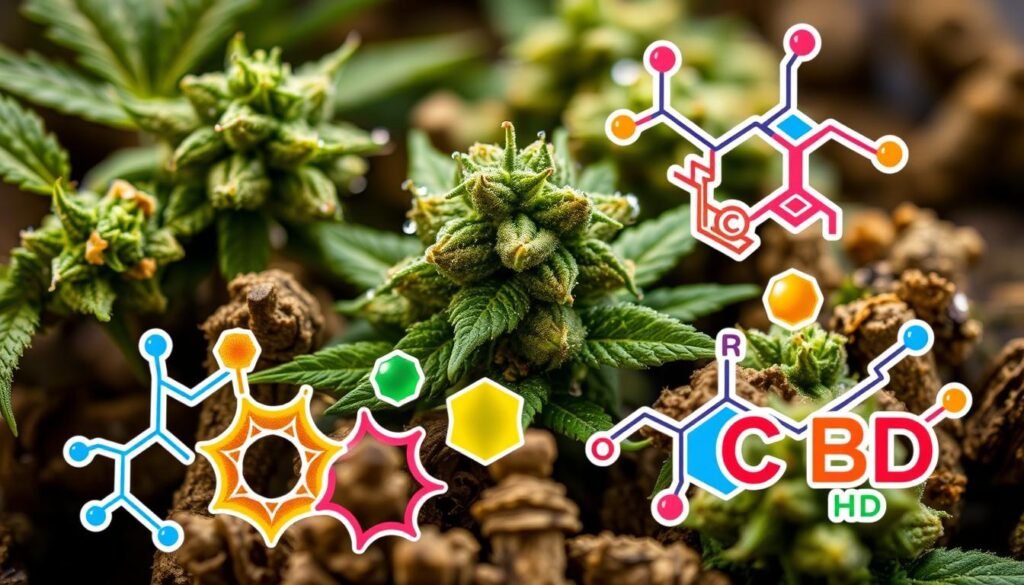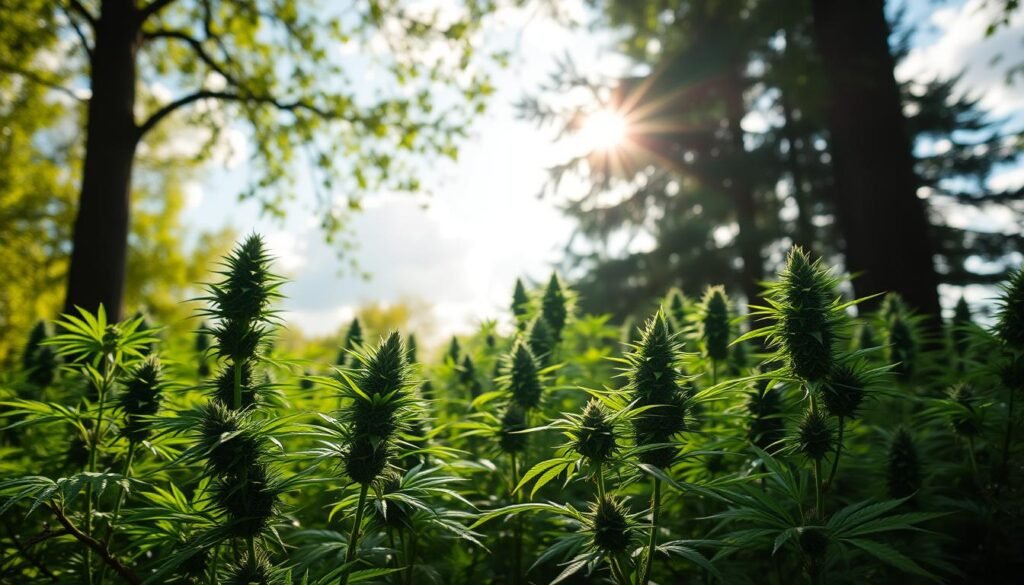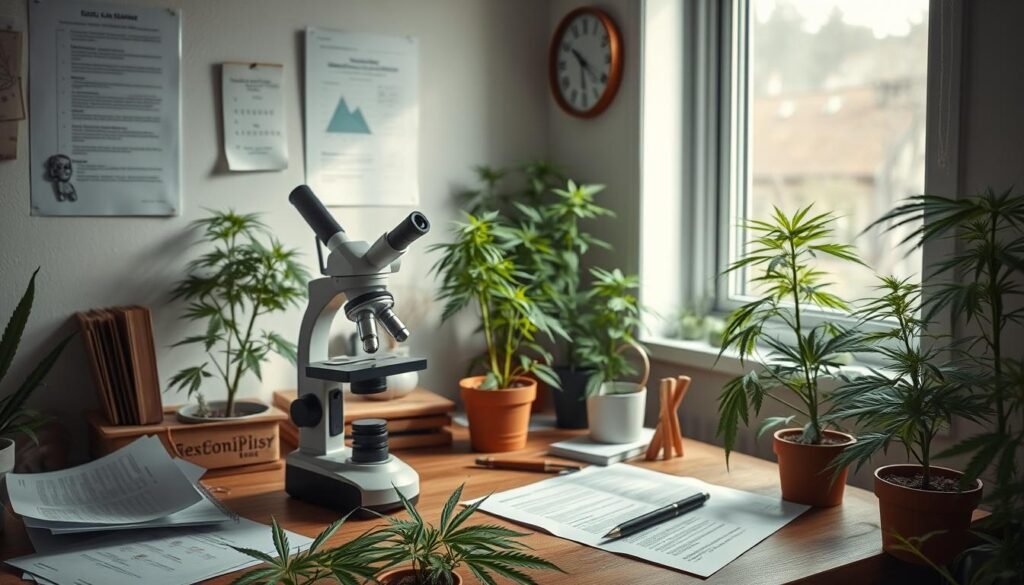35.7% of 12th graders have used marijuana in the past year. This fact brings up an important question: does marijuana help with anxiety? With the rise in anxiety disorders, a lot of people are trying marijuana for relief. We’ll look into the benefits of cannabis for anxiety, including the science behind it, the different kinds, and how it links to mental health. This guide will explore how marijuana affects anxiety and discuss the possible risks. As more people consider cannabis as an option, it’s critical to make informed decisions.
Key Takeaways
- 35.7% of 12th graders reported marijuana use in the past year.
- Cannabis may provide short-term relief from anxiety symptoms.
- Over 50% of medical cannabis users report using it specifically for anxiety.
- Daily use of marijuana is a concern among youth and may impact mental health.
- CBD is recognized for its anxiety-reducing properties, often more effective than THC.
- Further research is needed to fully understand marijuana’s long-term effects on anxiety.
Understanding Anxiety and Its Impact on Mental Health
Anxiety disorders are a big challenge for mental health in the U.S. They show up in different ways, affecting people’s everyday lives and happiness. It’s crucial to understand anxiety to deal with its big effects.
Overview of Anxiety Disorders
Anxiety disorders include many conditions like generalized anxiety, panic disorder, and social anxiety. They are the most common mental health issues in the nation. This highlights the need for more awareness and better treatment options. Despite how widespread they are, many people do not get help. Only about 46% of those with anxiety disorders seek treatment. This shows a big gap in mental healthcare.
Statistics on Anxiety Prevalence in the United States
The table below shows how common anxiety disorders are in the U.S. It reveals the high rates at which people are affected by these issues.
| Statistic | Data |
|---|---|
| Percentage of U.S. Population Affected | 31% |
| Individuals Receiving Treatment | 46% |
| Commonness of Anxiety Disorders | Most common mental health conditions |
| Conditions Treated with Medical Cannabis | Top conditions since 2019 |
Anxiety does more than just cause worry. It makes people look for other treatments like medical cannabis. Studies show cannabis, with different levels of THC and CBD, might help manage anxiety. But, the research gives mixed signals. It means cannabis shouldn’t replace usual therapies but can be used with them. The link between anxiety and using cannabis shows why more research is needed in this area.
Exploring Marijuana: Types and Components
Marijuana has been getting a lot of focus for its possible health perks, including easing anxiety. This plant is made up of several main parts. These parts affect how people feel when they use marijuana. Knowing about these can help you decide if it’s right for anxiety help.
Key Components of Marijuana: THC and CBD
Tetrahydrocannabinol (THC) and cannabidiol (CBD) are what mainly makes marijuana work. THC can make you feel relaxed and happy. But CBD doesn’t get you high and may help with anxiety. Studies show THC can help with anxiety in some people but make it worse in others, especially in large doses.
A research found that a small daily amount of THC made anxiety less in people with DSM-II anxiety disorder. This suggests that how much THC you use is important.
The Role of Terpenes in Cannabis
The scent compounds in many plants, including cannabis, are called terpenes. They give marijuana its unique smell and influence its effects. Terpenes like d-limonene might help lessen anxiety together with THC and CBD. The mix of these elements in marijuana can boost its helpful effects.
Looking at both the cannabinoids and terpenes in a strain can help find the best one for reducing anxiety. Using stress control techniques, like those from mindfulness and exercise, with cannabis may help lower anxiety and boost mental health.

How Does Marijuana Affect Anxiety?
It’s vital to know how marijuana and anxiety interact, especially for those looking to it for relief. THC, a major compound in cannabis, can ease anxiety symptoms temporarily. It does this by affecting brain receptors linked to mood and stress.
However, THC’s impact on anxiety differs with the dose. Small amounts might help you relax, but too much could cause anxiety, fear, or panic. This shows how complex THC’s effects on anxiety can be.
The Science Behind THC and Anxiety Relief
Studies show cannabis can lessen symptoms for various anxiety disorders, like PTSD and social anxiety. A 2017 survey found over 81% of people believe in cannabis’s health benefits, particularly for anxiety relief. Certain terpenes, such as d-limonene, have been highlighted for their anxiety-reducing effects.
In an experiment with 20 participants, a mix of d-limonene and THC lowered feelings of anxiety and paranoia. This suggests cannabis’s potential in anxiety relief isn’t just about THC. Other compounds may also play a role. For more details, check out the research here.
Potential Risks of Using Marijuana for Anxiety
Despite its benefits, marijuana use comes with risks, especially at high THC levels. Users may face an increased heart rate, irritability, paranoia, and cognitive issues. This is more common in new users or those using large amounts.
There’s also a risk of dependence and addiction. This could lead to using cannabis as a crutch for emotional support. Additionally, smoking or vaping marijuana might cause lung problems or increase cancer risk. With more people experiencing anxiety nowadays, it’s crucial to consider these pros and cons before turning to marijuana for help.

| Aspect | THC Effects on Anxiety | Potential Risks |
|---|---|---|
| Low Doses | May provide relaxation and anxiety relief | Minimal risk |
| High Doses | Can induce anxiety, fear, and panic | Increased heart rate, paranoia |
| Combination with D-Limonene | Reduces THC-induced anxiety | No interference with THC effects |
| Dependence | Possible reliance on marijuana for stress management | May lead to addiction |
Does Marijuana Help With Anxiety? The Evidence
Marijuana and anxiety have a complex relationship. Many studies have shown different conclusions. Some evidence suggests marijuana can either soothe or worsen anxiety. This depends on the cannabis type and the person’s condition.
Research Studies Supporting Cannabis Use for Anxiety
A 2019 review looked at 83 studies on mental health, including anxiety. It found many medical marijuana users felt better. Specifically, 58% used it for anxiety relief. A 2015 review also found CBD oil might help those with anxiety disorders.
About 47% of PTSD patients using medical marijuana saw fewer panic attacks and flashbacks. Some people noticed low doses of THC could reduce anxiety at first. However, this effect might decrease over time.
Contradictory Evidence: When Cannabis Worsens Anxiety
A study in 2018 provided a different viewpoint. It showed that cannabis might initially ease anxiety and depression. But, it could lead to worse feelings in the long run. High-potency marijuana was linked to greater anxiety risks. Young people, in particular, showed concerns with addiction and psychosis.
Dr. Barnett stresses talking to a doctor before using marijuana for anxiety. Responses to cannabis vary based on strain and potency. This makes personalized advice crucial.

| Study Year | Findings |
|---|---|
| 2015 | CBD oil may help treat anxiety disorders. |
| 2018 | Short-term relief found, but long-term effects may worsen anxiety. |
| 2019 | Majority of cannabis users report anxiety relief. |
| 2020 | Higher-potency cannabis linked to increased anxiety. |
| 2023 | Link between cannabis use and major depressive disorder. |
Different Strains of Marijuana and Their Effects
Choosing the right marijuana strains can really help with managing anxiety. There are two main types: Indica and Sativa. Knowing the differences between them is key. This knowledge can help pick the most suitable strain. Different levels of cannabinoids in these strains can either help or worsen anxiety symptoms.
Indica vs. Sativa: Which is Better for Anxiety?
Indica and Sativa plants offer different Indica vs Sativa effects. Indicas are known for making people feel calm and relaxed. They are often used for easing stress. This is why they are chosen by people looking for anxiety relief. Indicas have more CBD, which lessens THC’s strong effects, making the experience milder.
Sativas, on the other hand, tend to lift your spirits. They might make you feel more creative and energetic. But for some, especially those who are easily anxious, Sativas might not be ideal. They have less CBD and more THC. Picking the right strain depends a lot on how you personally react to it.
Marijuana Strains Known for Anxiety Relief
There are several marijuana strains known for easing anxiety. Below are some top choices:
| Strain Name | Type | THC Content | Notable Effects |
|---|---|---|---|
| Northern Lights | Indica | 16% – 33% | Relaxation, euphoria |
| White Widow | Hybrid | 19% – 25% | Balanced effects, stress relief |
| Girl Scout Cookies | Hybrid | Up to 28% | Relaxation, euphoria |
| Gorilla Glue #4 | Hybrid | 25% – 30% | Stress relief, mood enhancement |
| Granddaddy Purple | Indica | 17% – 23% | Calm relaxation, sleep aid |
| Wedding Cake | Hybrid | 20% – 25% | Heightened mood, relaxation |
Talking to knowledgeable staff at dispensaries is key when looking for the right strain. They can help you find a strain that fits your anxiety management needs best.
Ways to Use Marijuana for Anxiety Relief
There are many ways to use marijuana for calming anxiety. Each method, like smoking, vaping, edibles, and oils, has its own benefits and things to think about. The method you choose can change how cannabis affects your anxiety.
Smoking vs. Vaping: Pros and Cons
Smoking and vaping let users feel the effects very fast, which helps quickly with anxiety. But, smoking may irritate the lungs, while vaping is cleaner. Yet, both can make it hard to control how much you use.
For anxiety, small doses of cannabis are often better. Start with as little as 2.5mg of THC and go up slowly for the best relief. Be careful when changing doses, as too much can make anxiety worse, not better.
Edibles and Oils: Alternative Consumption Methods
Edibles last longer but are harder to dose correctly, which can accidentally lead to high doses that raise anxiety. CBD-dominant options like ACDC can reduce anxiety without making you feel “high.”
If you’re looking into edibles for anxiety, remember they have strong and long-lasting effects. Tinctures and oils can be easier to control compared to traditional edibles, offering a balanced way to manage symptoms.
Legal Considerations Around Marijuana Use
The laws around marijuana in the U.S. are changing. This creates a complex situation for cannabis. There have been big changes over the years. These have led to different rules for medical and recreational use. Knowing these rules is key for those wanting to use marijuana for health reasons.
Cannabis Legislation Across the United States
In 1996, California was the first to allow medical marijuana with Proposition 215. Now, medical cannabis is okay in 37 states, Washington D.C., Guam, Puerto Rico, and the U.S. Virgin Islands. On the other hand, 18 states, Washington D.C., and two territories have okayed recreational use. But, Kansas, Nebraska, and Idaho have a total ban. The rules vary a lot from state to state. This makes it confusing for everyone.
Medical vs. Recreational Use: What’s the Difference?
There’s a big difference between medical and recreational marijuana. For medical use, you need a prescription. It’s often for treating conditions like anxiety. Recreational use is legal in many places but has its own rules. These rules include how much you can use and where. On the federal level, cannabis is still seen like heroin and LSD. This makes things complicated, especially for doctors.
Understanding local laws is crucial. It helps people manage anxiety without legal problems. It’s important for users to stay informed.
Potential Side Effects of Marijuana on Mental Health
Users of marijuana must know the potential mental health side effects. Short-term effects can lead to surprising results, especially for frequent users. Being informed helps users make smarter choices about cannabis use.
Short-term Effects: What to Expect
Some marijuana side effects appear soon after use. The common short-term effects are:
- Increased heart rate
- Impaired memory
- Heightened anxiety or panic attacks
About 27% of people who visit emergency rooms for cannabis end up with new anxiety disorders in three years. Only 5% of the general population experience this. This shows the higher mental health risks with cannabis use.
Long-term Risks of Regular Use
Long-term use of cannabis may cause serious mental health issues. Studies find that regular users may face:
- Increased anxiety and depression risks
- A higher chance of substance use disorders
- Possible cognitive damage, especially if use starts in adolescence
People with anxiety disorders who go to the ER for cannabis use get hospitalized or have more ER visits. Their rate is nearly four times higher than others. This shows a significant rise in severe mental health problems from marijuana.
While cannabis might offer temporary relief, depending on it has big downsides. These include mood swings and withdrawal symptoms when stopping. It’s key to keep an eye on mental health, especially for regular users (source). Possible effects like hallucinations, disorientation, or paranoia highlight the risks.
Conclusion
Marijuana use for anxiety is complex. Research shows cannabis may reduce anxiety in some people because of THC and CBD. CBD is known for easing anxiety, but THC might increase it in some cases. This means experiences and doses need to be personal. The use of these substances might open doors for those not helped by standard treatments.
The success of cannabis in treating anxiety depends on the strain and how it’s used. Cannabis has over 500 chemicals, making its effects varied. However, studies suggest CBD may lessen the negative effects of THC. This points to cannabinoid treatments focusing on CBD as a good approach for anxiety. This shows the importance of knowing how different people react to cannabis.
To conclude, exploring cannabis for mental health care needs caution and more study. Although many turn to marijuana for anxiety, it doesn’t work well for everyone. There’s also the chance of negative reactions. It’s key to talk with health professionals to make the best choice for you regarding marijuana and anxiety.